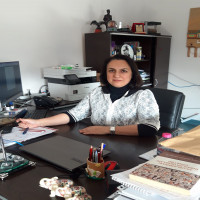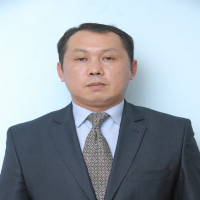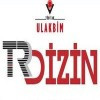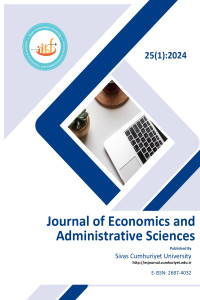Research Article
Aim & Scope
Broadcast Content
Cumhuriyet University Journal of Economics and Administrative Sciences contains original scientific publications.
Purpose and Scope
The aim of the journal is to contribute to science by publishing high quality publications of scientific importance. For this purpose, original research articles, reviews and letters to the editor are published in all fields related to social sciences. Cumhuriyet University Journal of Economics and Administrative Sciences is an independent, double-blind peer-reviewed, open access and online journal that aims to publish articles in all related fields. Articles should describe original data that have not been previously published or submitted for publication elsewhere. In accordance with the publication policies of Cumhuriyet University Journal of Economics and Administrative Sciences, manuscripts that comply with the submission rules and the scope of the journal are sent to at least two referees who are experts in their fields for scientific evaluation. The members of the Editorial Board of Cumhuriyet University Journal of Economics and Administrative Sciences discuss the suitability of the articles included in the process, and then take into account the comments of the referees on each submission. The final decision for all submitted manuscripts belongs to the Editor-in-Chief. The Editorial Board of Cumhuriyet University Journal of Economics and Administrative Sciences undertakes to comply with the criteria of the International Council of Medical Journal Editors (ICMJE), World Association of Medical Editors (WAME) and Committee on Publication Ethics (COPE).
Publication Language
Full Text Publication Language:
- Primary Language: Turkish
- Secondary Language: English
Content Written in English and Latin Alphabet:
- Article Title: Turkish & English
- Author Name: Turkish (in Latin Alphabet)
- Author Address: English (in Latin Alphabet)
- Keywords: Turkish & English
- Bibliography: English (in Latin alphabet)
Full Text: Turkish (in Latin Alphabet)
Subject Category:
Social Sciences: Economics, Business Administration, Political Science and Public Administration, Finance, International Relations, Labour Economics and Industrial Relations
Article Submissions
Submitted manuscripts should be appropriate to the purpose and scope of the journal. Original, unpublished manuscripts that are not in the evaluation process in another journal and whose content and submission have been approved by each author are accepted for evaluation.
Readership
The target readership is members of the profession, experts, researchers, specialists and doctoral students in the field of social sciences as well as students related to this field. It aims to contribute to the spread of continuous professional development and research culture.
Copyright
The copyrights of the studies published in Cumhuriyet University Journal of Economics and Administrative Sciences belong to their authors. The authors give permission for the intellectual work they submit to be published by Cumhuriyet University Journal of Economics and Administrative Sciences under the Creative Commons Attribution-NonCommercial 4.0 International (CC BY-NC 4.0) licence.
Originality of Articles
Cumhuriyet University Journal of Economics and Administrative Sciences does not accept studies previously published elsewhere.
Author Guidelines
* Submission of articles to the journal can only be done through DergiPark. Articles sent to the journal's e-mail address or editorial board will not be taken into consideration.
A. Article Preparation
Language: Turkish, English
The languages of the magazine are Türkiye Turkish and English.
Article Types: Research Article, Review Article and Letter to the Editor.
However, we advise authors to be as concise as possible for dissemination of the work.
Article Format: It is sufficient to upload the article to the system by writing it on A4 size paper, using one (1) line spacing, in a maximum of 25 pages, including the Abstract, References and Extended Abstract sections, in Times New Roman character, 12 point font.
Citation Style: APA 7
Author Change: Processed only before the article is accepted. Authors should carefully review the list and order of authors before submitting their manuscript and must ensure the exact author list at the time of original submission.
B. Writing Rules
1) Submission of articles to the journal can only be done through DergiPark. Articles sent to the journal's e-mail address or editorial board will not be taken into consideration.
2) APA 7 spelling rules should be overall standard for manuscripts submitted to the journal.
3) It is sufficient for the article to be uploaded to the system by using one (1) line spacing, on A4 size paper, with a maximum of 25 pages, in Times New Roman, 12 font size. If the manuscript is accepted, the format requirements will be made by the "Spelling and Language Editors" of the journal.
4) If there are attachments such as tables, graphics, formulas in the article, it is also important to send them in a separate "Word" file.
5) The first page of the manuscript should include the title of the article, the author(s) name-surname, title, ORCID Number and contact information.
6) The manuscript should have Turkish and English titles. The Turkish title should not exceed 15 words.
7) The manuscript must contain a Turkish "Abstract" section of at least 250 words. An English abstract should also be included.
8) On the last page of the manuscript, there should be an Extended English Abstract with "introduction, method, findings and discussion sections", not less than 1000 words.
9) Key words in the article should be specified in Turkish and English, with a maximum number of 5.
10) The JEL (Journal of Economic Literature) classification should be shown after the abstracts in the article.
For classification, https://www.aeaweb.org/econlit/jelCodes.php can be used.
Below are the supplementary files required along with the manuscript prepared in accordance with the Manuscript Writing Rules:
1) Manuscripts with a bibliography excluded similarity report of more than 25% obtained using Turnitin/iThenticate software will not be evaluated. However, the decision whether the manuscript contains plagiarism is not made only by looking at the results of the similarity report. The editor examines the citation system used in the article along with the report in question and explains his/her final decision. The editor's final decision may be sending it back to the author for necessary corrections, or it may be rejecting the article.
2) Copyright Notice Text
3) Ethics committee approval should be uploaded to the system in studies that require ethics committee approval*.
*Research that requires Ethics Committee approval is as follows.
• All kinds of research conducted with qualitative or quantitative approaches that require data collection from the participants by using survey, interview, focus group work, observation, experiment and interview techniques,
• Use of humans and animals (including material/data) for experimental or other scientific purposes,
• Clinical studies on humans,
• Research on animals,
• Retrospective studies in accordance with the law on the protection of personal data,
Additionally,
• Informing that “informed consent form” was taken in case reports,
• Obtaining and specifying permission from the owners for the use of scales, questionnaires, photographs belonging to others,
• Indication of compliance with copyright regulations for the intellectual and artistic works used,
*Retrospective ethics committee approval is not required for manuscripts that were published before 2020, derived from postgraduate/doctoral studies (must be specified in the article), applied for publication to the journal in the previous year, accepted but not yet published. In addition, in manuscripts with research data before 2020 and submitted to the journal in 2020, ethical reports are not requested, provided that the author states in the method section that the study data belongs to a date prior to 2020.
C. Final Checklist
It is hoped that this list will be useful during the final check of the prepared article before it is uploaded to the journal system.
Make sure the following items are available:
1. Author information has been added (with English versions).
• E-mail address
• Full mailing address
2. All required files have been installed.
• Article text
• Similarity report obtained using Turnitin/iThenticate software
• Copyright Notice Text
• In studies requiring ethics committee permission*, ethics committee permission must be uploaded to the system.
3. The article has been "spelling checked" and "grammar checked".
4. All references cited in the bibliography are cited in the text and vice versa.
D. Submit Article
In applications, the account of the corresponding author of the study should be used. All correspondence regarding the application is forwarded to the corresponding author via e-mail sent through the journal system.
When uploading the article file, make sure that this file does not contain any elements that would reveal the author's identity due to the double-blind peer review process.
During submission, the following commitment is obtained from the author electronically:
1. I am authorized/authorized by the co-authors to submit this work to your journal.
2. The manuscript is original, has not been formally published in another peer-reviewed journal, is not under review by another journal, and does not violate any existing copyright or other third-party rights.
3. I/We agree that if the article is accepted for editorial publication, it will be licensed under the Creative Commons Attribution-NonCommercial 4.0 International (CC BY-NC 4.0) license.
4. The copyright and intellectual property rights of the author(s) or, if applicable, the author(s)' employer are reserved. The authors undertake that the publisher is not responsible for any claims or lawsuits to be filed by third parties due to copyright infringement and that all responsibility belongs to them.
5. The authors undertake that there are no criminal elements or illegal expressions in the article, and that no illegal materials and methods were used during the research).
E. Author's Guide
Authorship and Contribution
Authorship should be limited to those who made significant contributions to the conception, design, conduct or interpretation of the study. All significant contributors should be listed as co-authors. If there were minor contributors to the study, such as language editing, they should be acknowledged in the acknowledgments section. The corresponding author should ensure that all co-authors have seen and approved the final version of the manuscript and agree to its submission for publication. Authors are expected to carefully review the list and order of authors before submitting their manuscript and to provide the final author list at the time of original submission. Only in exceptional circumstances will the editor consider the addition, deletion or rearrangement of authors after the manuscript has been submitted. All authors must agree to any such addition, deletion or reorganization. Authors take joint responsibility for the work.
Author Change Requests
Addition, deletion or rearrangement of author names in the author list can only be made before the manuscript is accepted and only if approved by the Editor of the journal.
If such a change is requested, the Editor will request from the responsible author (a) the reason for the change in the author list and (b) written confirmation (e-mail) from all authors that they agree to the addition. Only in exceptional cases will the Editor consider the addition, deletion or reorganization of authors after the article has been accepted.
Article Writing
Authors of original research papers should address the topic in an original way and with an objective discussion. The paper should include sufficient detail and references to allow others to replicate the work. Fraudulent or knowingly false statements constitute unethical behavior and are unacceptable.
Originality
The author must ensure that the article is original, has not been previously published elsewhere and is not under consideration for publication elsewhere, in another language.
Using Original Sources and Citation
Authors should ensure that they are writing entirely original work and, if they have used the work or words of others, that it is properly cited. Privately obtained information, such as in conversations, correspondence or discussions with third parties, should not be used without the express written permission of the source.
Data Access and Preservation
Authors may be asked to provide research data supporting their articles for editorial review and/or to comply with the journal's open data requirements. Authors should be prepared to provide public access to such data, if possible, and to retain such data for a reasonable period after publication. The journal recommends uploading research data to TUBITAK's Aperta Portal.
Multiple and Simultaneous Broadcasting
An author should not publish the same research article in more than one journal. It is unethical to submit the same article to more than one journal at the same time. An author should not submit a previously published article for consideration in another journal, except in the form of an abstract.
Publication of Studies Based on Surveys and Interviews
1) Manuscripts with a bibliography excluded similarity report of more than 25% obtained using Turnitin/iThenticate software will not be evaluated. However, the decision whether the manuscript contains plagiarism is not made only by looking at the results of the similarity report. The editor examines the citation system used in the article along with the report in question and explains his/her final decision. The editor's final decision may be sending it back to the author for necessary corrections, or it may be rejecting the article.
2) Copyright Notice Text
3) Ethics committee approval should be uploaded to the system in studies that require ethics committee approval*.
*Research that requires Ethics Committee approval is as follows.
• All kinds of research conducted with qualitative or quantitative approaches that require data collection from the participants by using survey, interview, focus group work, observation, experiment and interview techniques,
• Use of humans and animals (including material/data) for experimental or other scientific purposes,
• Clinical studies on humans,
• Research on animals,
• Retrospective studies in accordance with the law on the protection of personal data,
Additionally,
• Informing that “informed consent form” was taken in case reports,
• Obtaining and specifying permission from the owners for the use of scales, questionnaires, photographs belonging to others,
• Indication of compliance with copyright regulations for the intellectual and artistic works used,
*Retrospective ethics committee approval is not required for manuscripts that were published before 2020, derived from postgraduate/doctoral studies (must be specified in the article), applied for publication to the journal in the previous year, accepted but not yet published. In addition, in manuscripts with research data before 2020 and submitted to the journal in 2020, ethical reports are not requested, provided that the author states in the method section that the study data belongs to a date prior to 2020.
Conflict of Interest
Any financial or other interest that may cause the person to be conflicted in his or her work, significantly impair his or her objectivity, or provide an unfair advantage in favor of any person or organization. All sources of financial support received during the conduct of the research and preparation of the manuscript and the role of sponsors in the study should be disclosed. If there is no source of funding, this should also be indicated. Examples of potential conflicts of interest that should be disclosed include consultancies, salaries, grants. Potential conflicts of interest should be disclosed at the earliest possible stage.
Error Reporting
When an author discovers a significant error or inaccuracy in his/her published work, he/she should notify the journal immediately. It is also the author's obligation to cooperate in withdrawing or correcting the manuscript if deemed necessary by the editor. If the editor or publisher learns from a third party that a published work contains an error, it is the author's obligation to cooperate with the editor, including informing the editor.
Image Integrity
It is not acceptable to enhance, darken, move, remove or add a specific feature in an image. Authors must adhere to the policy for graphic images implemented by the journal.
Ethical Principles and Publication Policy
Publication Ethics and Principles
Publication Ethics may be defined as a self-regulatory mechanism insisting on integrity on the part of authors, peer reviewers, and publishers to establish higher standards of editorial processing. Ethical standards for publication exist to ensure high-quality scientific publications, public trust in scientific findings, and that people receive credit for their ideas.
• Ethical researchers do not plagiarize.
• They do not misreport sources.
• They do not conceal objections that they cannot rebut.
• They do not caricature or distort opposing views.
• They do not destroy or conceal sources and data important for those who follow.
Peer-reviewed studies are the ones that support and materialize the scientific method. At this point, it is of utmost importance that all parties included in the publication process (authors, readers, and researchers, publisher, reviewers, and editors) comply with the standards of ethical considerations. The Cumhuriyet University Journal of Economics and Administrative Sciences adheres to national and international standards on research and publication ethics. It complies with Press Law, Intellectual and Artistic Works Law, and Higher Education Institutions Scientific Research and Publication Ethics Directive. The Cumhuriyet University Journal of Economics and Administrative Sciences adopted the International Ethical Publishing Principles published by the Committee on Publication Ethics (COPE), Directory of Open Access Journals (DOAJ), Open Access Scholarly Publishers Association (OASPA), and World Association of Medical Editors (WAME). It also undertakes to comply with the Decisions of the Turkey Editors' Workshop.
Duplicate Publication
Duplicate publication is the publication of the same article or substantially similar articles in more than one journal. The editor returns the article unreviewed. After that, the editor may consider no articles by any of the authors for a period of time and may announce publicly in the journal (perhaps as a simultaneous announcement with the editor of the journal that published the earlier article) that the authors have submitted a previously published article, or may do any combination of these actions, at the editor’s discretion.
Simultaneous Submission of Manuscripts
Authors may not send the same manuscript to more that one journal at the same time. If the editor learns of possible simultaneous submission, the editor reserves the right to consult with the other editor(s) who have received the article. Further, the editor may return the article without review, or may reject it without regard to the reviews, or make this decision in discussion with the other editor(s) involved, and may decide to consider no articles from the author from the authors for a period of time, and may also write to the authors' employers, or may do any combination of these actions, at the editor’s discretion.
Publication Check for Plagiarism
In an instructional setting, plagiarism occurs when a writer deliberately uses someone else’s language, ideas, or other original (not common knowledge) material without acknowledging its source.
The Cumhuriyet University Journal of Economics and Administrative Sciences routinely screens article submissions for Plagiarism. The studies submitted for review are checked for plagiarism using the Turnitin software. The similarity rate is expected to be less than 15%. The main measure of similarity is that the author complies with the citation and citation rules. Even though the similarity rate is 1%, if the citation and citation are not duly made, plagiarism may still be in question. In this respect, citation and citation rules should be known and carefully applied by the author: APA 7
All submitted manuscripts to the journal are scanned for similarity via Turnitin to prevent plagiarism. Plagiarism, duplication, false authorship/denied authorship, research/data fabrication, article slicing, slicing, copyright infringement, and concealment of conflict of interest are considered unethical behaviors. All articles that do not comply with accepted ethical standards are removed from the publication. This includes articles with possible irregularities and inconsistencies detected after publication.
Data Fabrication and Falsification
Data fabrication means the researcher did not actually do the study but made up data. Data falsification means the researcher did the experiment but then changed some of the data. Both of these practices make people distrust scientists. If the public is mistrustful of science, then it will be less willing to provide funding support.
Human Participants
The Cumhuriyet University Journal of Economics and Administrative Sciences requires that all research involving personal or sensitive data or material relating to human participants that is not legally available to the public is subject to formal ethical review.
Dealing with Allegations of Research Misconduct
The Cumhuriyet University Journal of Economics and Administrative Sciences abides the Ethics Toolkit for a Successful Editorial Office. Editors of the Cumhuriyet University Journal of Economics and Administrative Sciences; will take reasonable steps to prevent the publication of papers where plagiarism, citation manipulation, data tampering, data fabrication, and other research misconduct have occurred. In no case will Cumhuriyet University Journal of Economics and Administrative Sciences or its editors knowingly allow such misconduct to occur. If the editors of Cumhuriyet University Journal of Economics and Administrative Sciences aware of any allegations of research misconduct related to an article published in their journal, they will follow COPE’s Ethical Principles Flow Chart.
Ethical Violation Notices
When readers notice a significant error or mistake in an article published in Cumhuriyet University Journal of Economics and Administrative Sciences, or have any complaints about editorial content (plagiarism, duplicate articles, etc.), they can send an email to iibf@cumhuriyet.edu.tr. We welcome applications as it will provide an opportunity for us to improve, and we respond quickly and constructively.
Correction, Retraction, Expression of Concern
Editor should consider publishing correction if minor errors that do not effect the results, interpretations and conclusions of the published paper are detected. Editor should consider retraction if major errors and/or misconduction that invalidate results and conclusions are detected. Editor should consider issuing an expression of concern if there is evidence of research or publication misconduct by the authors; there is evidence that the findings are not reliable and institutions of the authors do not investigate the case or the possible investigation seems to be unfair or nonconclusive. The guidelines of COPE and ICMJE are taken into consideration regarding correction, retractions or expression of concern.
Publication of Studies Based on Survey and Interview
The Cumhuriyet University Journal of Economics and Administrative Sciences adopts the "Code of Conduct and Best Practice Guidelines for Journal Editors" and "Code of Conduct for Journal Publishers" of the Publication Ethics Committee (COPE) in order to create ethical assurance in scientific periodicals. In this context, the authors are requested to comply with the following issues in the studies submitted to the journal:
1) For research conducted in all branches of science that require ethics committee permission (ethics committee approval must be obtained, this approval must be stated and documented in the article.
2) In research that requires ethics committee permission, information about the permission (name of the committee, date and number) is given in the method section, and after the bibliography section of the article; In case reports, information about signing the informed consent/consent form should be included in the article.
Special Issue Publishing Policy
A special issue may be published in our journal once a year upon the request of the Editorial Board. Articles submitted for inclusion in the special issue are first subjected to editorial preliminary review. It is then examined for compliance with the journal's spelling rules and similarity scanning is performed to prevent plagiarism. After these stages, it is taken into the peer evaluation process where the double-blind model is used.
Editorial Duty of Confidentiality
The Cumhuriyet University Journal of Economics and Administrative Sciences's editors treat all submitted manuscripts as confidential documents, which means they will not divulge information about a manuscript to anyone without the authors' permission. During the process of manuscript review the following people may also have access to manuscripts:
Editors and editorial staff at The Cumhuriyet University Journal of Economics and Administrative Sciences,
External reviewers,
Members of the journal's editorial committees,
The only occasion when details about a manuscript might be passed to a third party without the authors’ permission is if the editor suspects serious research misconduct.
Allegations of Scientific misconduct - Suspect Research or Publication Misconduct
There are differing definitions of scientific misconduct. At the Cumhuriyet University Journal of Economics and Administrative Sciences, we deal with these problems on a case by case basis while following guidance produced by the major publication ethics bodies. Editors have a duty to act if they suspect misconduct or if an allegation of misconduct is brought to them. This duty extends to both published and unpublished papers. Editors should not simply reject papers that raise concerns about possible misconduct. They are ethically obliged to pursue alleged cases. Editors should follow the COPE flowcharts where applicable. Editors should first seek a response from those suspected of misconduct. If they are not satisfied with the response, they should ask the relevant employers or institution, or some appropriate body (perhaps a regulatory body or national research integrity organization) to investigate. Editors should make all reasonable efforts to ensure that a proper investigation into alleged misconduct is conducted; if this does not happen, editors should make all reasonable attempts to persist in obtaining a resolution to the problem. This is an onerous but important duty.
The Cumhuriyet University Journal of Economics and Administrative Sciences abides the Ethics Toolkit for a Successful Editorial Office. Editors of Cumhuriyet University Journal of Economics and Administrative Sciences; will take reasonable steps to prevent the publication of papers where plagiarism, citation manipulation, data tampering, data fabrication, and other research misconduct have occurred. In no case will Cumhuriyet University Journal of Economics and Administrative Sciences or its editors knowingly allow such misconduct to occur. If Cumhuriyet University Journal of Economics and Administrative Sciences and its editors are aware of any allegations of research misconduct related to an article published in their journal, they will follow COPE’s guidelines in dealing with allegations. Reviewers should notify the Editor when they suspect research or publication misconduct. The editor is responsible for carrying out the necessary actions by following the COPE recommendations.
The Cumhuriyet University Journal of Economics and Administrative Sciences undertakes implementing the COPE Flowcharts when it encounters allegations of misconduct on the following or similar issues.
• Redundant (duplicate) publication in a submitted manuscript
• Plagiarism in a submitted manuscript
• Fabricated data in a submitted manuscript
• Changes in authorship
• Undisclosed conflict of interest in a submitted manuscript
• Ghost or gift authorship in a submitted manuscript
• Suspected ethical problem in a submitted manuscript
• Responding to whistleblowers when concerns are raised directly
• Responding to whistleblowers when concerns are raised via social media
Complaints Procedure
This procedure applies to complaints regarding content, procedures or policies that are the responsibility of Cumhuriyet University Journal of Economics and Administrative Sciences or our editorial staff. Complaints can provide an opportunity and incentive for improvement and we aim to respond quickly, courteously and constructively.
The complaint must be related to the content, procedures or policies that are the responsibility of Cumhuriyet University Journal of Economics and Administrative Sciences or our editorial team. Complaints should be emailed directly to iibf@cumhuriyet.edu.tr and will be treated confidentially. The editor responds to complaints immediately. The editor follows the procedure outlined in the COPE flowchart regarding complaints.
Complaints are reviewed by the relevant member of the editorial team and if they cannot be resolved, the following processes are followed:
• If this initial response is deemed inadequate, the complainant may request that their complaint be referred to a more senior member of the journal.
• If the complainant is dissatisfied, complaints can be forwarded to the editor-in-chief.
• A full response will be given within two weeks if possible.
COPE publishes a code of practice for editors of scientific journals. This will facilitate the resolution of disputes with editors, journals and publishers, but can only be submitted after the journal's own complaints procedures have been exhausted.
Appeal Process
Peer review by editors and external reviewers is usually based on a mix of evidence and opinion, and some decisions to reject may be close calls. We welcome serious appeals. If you believe that we have rejected your article wrongly, perhaps because we have misunderstood its scientific content, please submit an appeal (rebuttal) letter to our editorial team at iibf@cumhuriyet.edu.tr. Do not try to submit a revised version of your article at this stage. If we agree, on reading your rebuttal letter, that your appeal is warranted we may then invite you to submit a revised version of your article that we will enter again into our peer review process. Lastly, we can consider only one appeal per manuscript, so please spend as much time and effort on writing the rebuttal letter as you think necessary to put the case clearly - you have one chance, so use it well. We have found that prolonged negotiation over rejected papers are usually unsatisfactory for both authors and editors, so we no longer engage in this.
Conflicts of Interest
Conflict of interest exists when professional judgment concerning a primary interest may be influenced by a secondary interest (such as financial gain or personal rivalry). We believe that, to make the best decision on how to deal with an article, we should know about any competing interests that authors may have, and that if we publish the article readers should know about them too.
Conflict of Interest is any financial or other interest that may conflict with one's work, significantly impair objectivity, or provide an unfair advantage to any person or organization. All authors must disclose in their writing any financial and personal relationships with individuals or organizations that may be seen to improperly influence their work. All financial support resources and the role of sponsors in the study should be explained during the conduct of the research and the preparation of the article. If there is no source of funding, this should also be stated. Examples of potential conflicts of interest that need to be disclosed include consultations, hiring, grants.
Potential conflicts of interest should be disclosed at the earliest possible stage. The Cumhuriyet University Journal of Economics and Administrative Sciences has a declared process for handling submissions from the editors, employees or members of the editorial board to ensure unbiased review. Such manuscripts are primarily directed to other journals. If this is not possible, the author's role in the Journal will be temporarily terminated. These submissions are reviewed through a double-blind process.
The editor must not be involved in decisions about papers which s/he has written him/herself or have been written by family members. Further, any such submission must be subject to all of the journal’s usual procedures. The editor shall apply the ICMJE guidelines relating to the disclosure of potential conflicts of interest by authors and reviewers.
Research Ethics
The Cumhuriyet University Journal of Economics and Administrative Sciences adheres to the highest standards in research ethics and follows the principles of international research ethics as defined below. The authors are responsible for the compliance of the manuscripts with the ethical rules.
• Principles of integrity, quality, and transparency should be sustained in designing the research, reviewing the design, and conducting the research.
The research team and participants should be fully informed about the aim, methods, possible uses and requirements of the research, and risks of participation in research.
• The confidentiality of the information provided by the research participants and the confidentiality of the respondents should be ensured. The research should be designed to protect the autonomy and dignity of the participants.
• Research participants should participate in the research voluntarily, not under any coercion.
• Any possible harm to participants must be avoided. The research should be planned in such a way that the participants are not at risk.
• The independence of research must be clear; any conflict of interest or must be disclosed.
• In experimental studies with human subjects, written informed consent of the participants who decide to participate in the research must be obtained. In the case of children and those under wardship or with confirmed insanity, the legal custodian’s assent must be obtained.
• If the study is to be carried out in any institution or organization, approval must be obtained from this institution or organization.
• In studies with a human subject, it must be noted in the method’s section of the manuscript that the informed consent of the participants and ethics committee approval from the institution where the study has been conducted have been obtained.
Price Policy
If the article passes the preliminary evaluation of the Editorial Board and Field Editors, the authors are required to deposit "950 TL" to the bank account of "Sivas Cumhuriyet University Faculty of Economics and Administrative Sciences Journal" in order to cover the costs of the journal. (The requested fee is used as payment to the relevant persons in the field editor, referee, foreign language editor and writing-publication support stages in the publication processes of our journal).
The referee evaluation process will start only after the submission fee is paid.
Account information will be notified to the author if the article passes the preliminary evaluation process. Article ID and author's name and surname must be specified in the payment description.
The submission fee is not refundable if the article is rejected and/or not published as a result of the referee evaluations or by the decision of the Editorial Board. Requests for refunds based on different interpretations of referee or editor evaluations will not be considered.
Indexes
Citation Indexes
Other Indexes
Journal Boards
Editör
Editör Yardımcısı

Alan Editörü















Yabancı Dil Editörü

Yayın Kurulu


Cumhuriyet University Journal of Economics and Administrative Sciences is licensed under a Creative Commons Attribution-NonCommercial 4.0 International License (CC BY NC).







